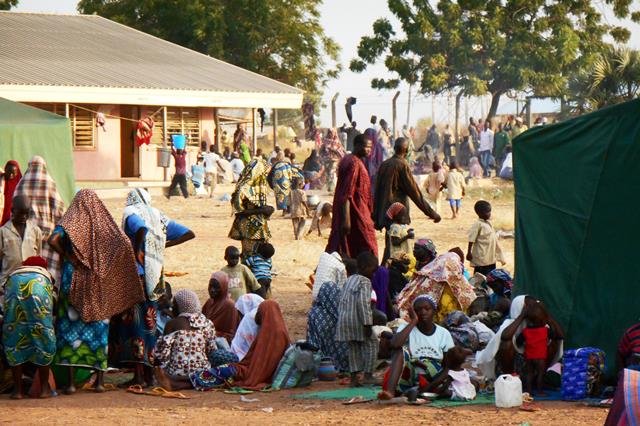Civilians displaced by Boko Haram sit at a camp near Yola, the capital of northeast Nigeria's Adamawa state.
The Cadre Harmonisé (CH) report says about 31.5 million Nigerians may experience food and nutrition crisis between June and August 2024.
Cadre Hatmonisé is a food and nutrition insecurity study conducted by the ministry of agriculture and food security in collaboration with other partners including the United Nations Food and Agriculture Organisation (FAO).
The report also indicated that about 24.7 million people, including 14,000 IDPs in 26 states and the federal capital territory (FCT), are to experience food crisis between March and May 2024.
“About 1.1 million people in Adamawa were expected to be in crisis or worse between June and August 2024, and about 2.1 million people in Borno were expected to be in crisis or worse between June and August,” the report said.
Advertisement
“Also, 1.5 million people in Yobe are expected to be in crisis or worse between June and August this year.
“During the current period, food consumption was under stress in most of the states and Crisis in some LGAs in Adamawa, Borno, Katsina, and Yobe, Zamfara States.
“Deteriorated food consumption situation was also observed among populations in the inaccessible areas and the IDPs in Adamawa, Borno, Sokoto, and Zamfara states.
Advertisement
“During the projected period (June to August 2024) more households are expected to face crisis level of food consumption in the states.”
According to the report, the imminent crisis is largely triggered by the surge in prices of food items which was linked to the removal of petroleum subsidy.
Some of the contributing factors to the food crisis highlighted in the report include insecurity, fuel scarcity, the naira devaluation currency crisis, and rising inflation and consumer price index (CPI) rates.
“The consequences of insecurity have led to the loss of livelihoods in Adamawa, Benue, Borno, Katsina, Niger, Plateau, Sokoto, Zamfara, and Yobe states,” the report added.
Advertisement
“Poor macroeconomic conditions are restricting access to agricultural inputs in the country; the high cost of transport, inflation rate, and the volatile dollar-naira exchange rate have negatively affected households’ income.
“In the projected period (June to August 2024), poor microeconomic conditions and conflicts are expected to drive limited access to livelihood opportunities.
“The nutrition situation in the Borno, Adamawa and Yobe and northwest states of Katsina, Sokoto, and Zamfara revealed the prevalence of malnutrition for under-5 children to be in crisis in the current situation.”
Advertisement
Add a comment





